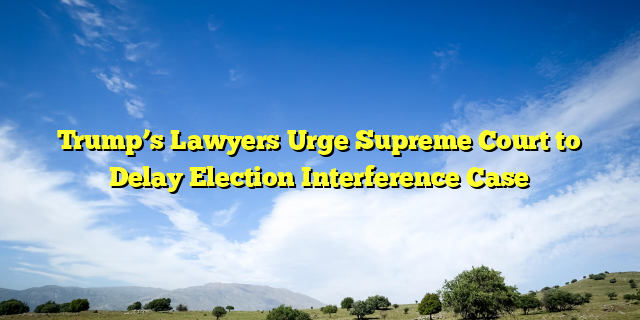Former President Donald Trump in court. (AP Photo/Eduardo Munoz Alvarez)
Former President Donald Trump’s legal team has requested the U.S. Supreme Court to postpone its involvement in the legal battle concerning his potential prosecution for alleged attempts to overturn the 2020 election results. This move comes in response to Special Counsel Jack Smith’s request for the Supreme Court to expedite its review of Trump’s claims of presidential immunity.
This high-stakes legal maneuver centers around the question of whether a former president can be prosecuted for actions taken while in office, a matter of first impression for the Supreme Court. The outcome of this case could significantly impact the 2024 presidential race, given Trump’s status as the leading Republican primary candidate.
The Immunity Argument and the Call for Delay
Trump’s lawyers argue that the complexity and historical significance of the presidential immunity issue warrant a more deliberate approach, rather than a rushed decision. They contend that the Supreme Court should allow the lower courts to complete their review before intervening. The D.C. Circuit Court of Appeals has already scheduled arguments for January 9th.
The defense team emphasized the potential political implications of a speedy trial, suggesting that the special counsel’s push for a quick resolution is motivated by a desire to interfere with Trump’s presidential campaign. They allege that a “nakedly political motive” underlies the effort to schedule the trial before the 2024 election.
The Impeachment Argument
Another key argument put forth by Trump’s defense is that he cannot be prosecuted for conduct for which he was impeached, and subsequently acquitted, by Congress. This argument has already been rejected by U.S. District Judge Tanya Chutkan, who is presiding over the case. However, the question of whether double jeopardy protections apply in this context remains a point of legal contention.
Chutkan’s Ruling and the Special Counsel’s Response
Judge Chutkan recently ruled that former presidents do not enjoy any special immunity from federal criminal prosecution. Following this ruling, Trump’s team appealed to the D.C. Circuit Court of Appeals. However, Special Counsel Smith took the unusual step of bypassing the appeals court and directly petitioning the Supreme Court to address the immunity question. Smith’s team argues that neither the Constitution nor legal precedent supports the concept of presidential immunity from criminal prosecution for actions taken while in office. They describe this as an “extraordinary case” requiring “extraordinary request.”
The Supreme Court’s Role and the Colorado Ballot Case
The Supreme Court has indicated it will swiftly decide whether to hear the immunity case, but has yet to announce its final decision. Judge Chutkan has temporarily paused the case pending the Supreme Court’s decision on the immunity claim, but has left open the possibility of maintaining the current March 4th trial date if the case returns to her court.
Adding to the legal complexities surrounding Trump’s candidacy, the Supreme Court is also expected to address a separate case concerning his eligibility to appear on the Colorado ballot. Trump’s lawyers have pledged to appeal a recent decision that disqualifies him from the ballot under Section 3 of the 14th Amendment, which prohibits individuals who have engaged in insurrection from holding public office. This case presents another significant legal challenge with far-reaching political ramifications.
The Stakes and Potential Outcomes
The Supreme Court’s decision on the presidential immunity issue will have profound consequences for the ongoing criminal proceedings against Trump and the broader legal landscape. A ruling in favor of immunity could significantly curtail the prosecution’s case, while a rejection of immunity could pave the way for a trial before the 2024 election.
The intersection of these legal battles with the upcoming presidential election creates a complex and unprecedented scenario. The outcome of these cases could not only determine Trump’s legal fate but also shape the course of the 2024 presidential race and the future of American politics.
Conclusion: A Critical Juncture for Law and Politics
The legal battles facing former President Trump represent a crucial intersection of law and politics. The Supreme Court’s decisions on presidential immunity and the 14th Amendment challenge will have far-reaching implications for both the legal system and the political landscape. As these cases unfold, the nation watches closely, recognizing the profound impact they will have on the future of American democracy.
